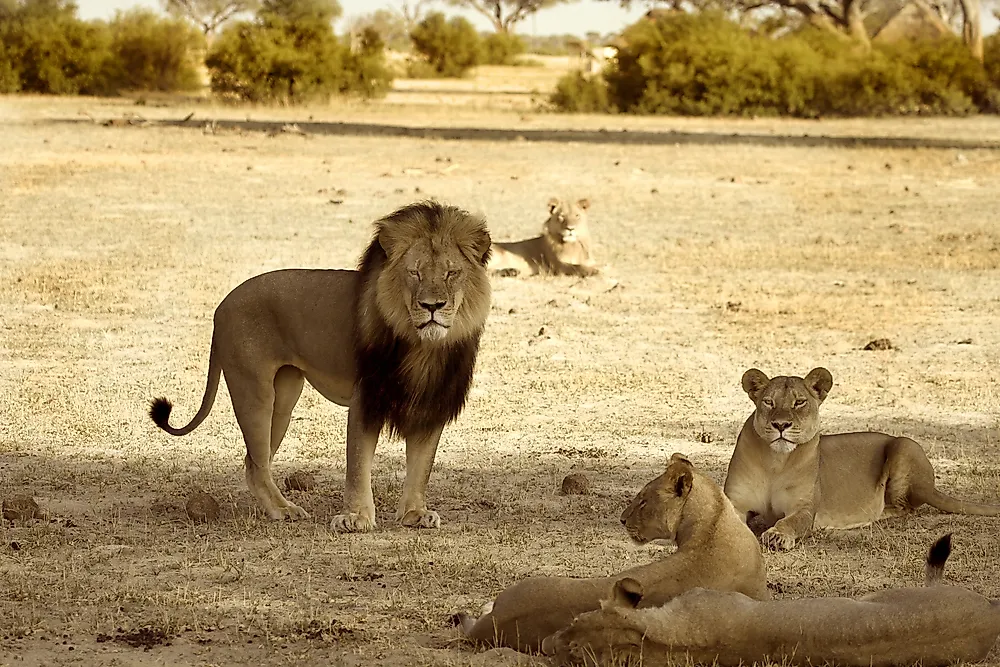Trophy Hunter Claims the Life of Xanda, Cecil the Lion's Son

One of the sons of Cecil the lion suffered the same fate as his father when trophy hunters claimed his life on July 7 just outside the boundaries of the Hwange National Park in Zimbabwe.
Two years back, 13-year old Cecil was shot near his birthplace close to the national park. He did not die immediately, but instead suffered the entire night, and was tracked down the next morning before being euthanized.
The death of the lion, who had been a a favorite of the visitors to the park, sparked global outrage and threw a spotlight on the billion dollar business of trophy hunting in Zimbabwe. Conservation groups acting in the country and around the world also expressed deep anger and resentment at the death of Cecil.
As of June 2016, Cecil was believed to have had 13 surviving daughters and sons and 15 grandcubs.
Now, one of his sons, the six-years old Xanda, who himself has fathered several cubs, was shot not far from where his father died. Although he was killed on July 7, the news of his loss became public only on Thursday. The fact that Xanda was wearing an electronic collar fitted by researchers helped in discovering his death (the collar had been fit to track his movements).
The Zimbabwean private hunter Richard Cooke was responsible for organizing the trophy hunt that had led to Xanda’s killing. He, however, did not reveal the name of the client who actually shot Xanda. The client may have paid tens of thousands of dollars for the cured and mounted head of Xanda to be delivered to his place of living.
Andrew Loveridge, the Oxford University scientist who led the team responsible for attaching the GPS tracking collar on Xanda, said that Xanda’s collar had been fitted last October and that he was monitored nearly every single day. Of late, Xanda and his pride were observed spending a significant amount of time outside the park’s boundaries but there was little the researchers could do to alter this situation.
Loveridge says that Cooke, whom he considers to be one of the “good guys”, returned the collar after he discovered it on Xanda’s body. According to Loveridge “his hunt was legal and Xanda was over 6 years old so it is all within the stipulated regulations of hunting.”
Loveridge also goes on to describe Xanda as a gorgeous Kalahari lion with a large body and a mane, both in perfect condition. “Personally, I think it is sad that anyone wants to shoot a lion, but there are people who will pay money to do that,” he told the Guardian.
A Familiar Controversy
When the Telegraph broke the news of the 2015 killing of Cecil by the 55-year-old American dentist Walter James Palmer, he was forced to abandon his practice for weeks amid a global public outrage. It was discovered that Palmer had paid US$65,000 to hunt the much-loved lion using a bow and arrow. Thousands sent him hate messages and threats. However, the Zimbabwean police and government who planned to charge Palmer with poaching eventually lifted all accusations when they found that he did not break any hunting laws.
The negative media coverage that continued for days forced many US hunters to cancel their hunting trips to Zimbabwe. However, after the US lifted the ban on the importation of trophies, some began to return to the country in search of hunting pleasures.
In Xanda’s case, Mr. Cooke was contacted, but he did not answer his phone nor reveal the name of his client. Most of the lion trophy hunters arrive in Zimbabwe from the US, UK, South Africa or Germany.
The killing of Xanda has once more sparked the debate on the ethics of trophy hunting.
The UK director of the International Fund for Animal Welfare, Philip Mansbridge, told the Guardian, “these animals deserve our protection, not bullets.” He claims that his organization does not support the killing of wildlife but encourages the development ecotourism opportunities to assist communities living with wildlife.
At present, one of the viable solutions to prevent hunters from killing collared lions has been suggested by Mr. Loveridge. He hopes that a 5km exclusion zone is created around the Hwange National Park so that the accidental shooting of lions wandering out of the park can be avoided. He says this is a solution they have suggested for years but have been met with resistance as a significant volume of hunting happens right at the park’s boundaries.
**
Dr. Oishimaya Sen Nag is a writer and editor from India who is currently based in Kolkata. She has earned her Ph.D. degree and is presently engaged in full-time freelance writing and editing.











